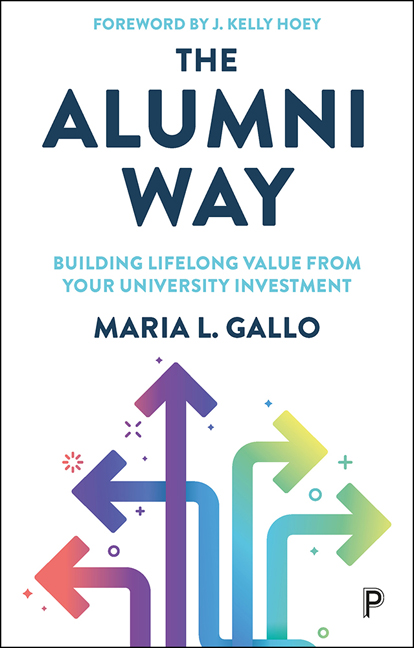Book contents
- Frontmatter
- Dedication
- Contents
- Acknowledgements
- Foreword
- Introduction: We are all alumni
- PART I Charting the course of the Alumni Way
- PART II The Alumni Way trait: Reflection
- PART III The Alumni Way trait: Curiosity
- PART IV The Alumni Way trait: Passion
- PART V The Alumni Way trait: Generosity
- PART VI Alumni: Bringing it into our lives
- Notes
- References
- About the author
- Index
19 - Generosity trait summary: Our generosity as service
Published online by Cambridge University Press: 13 May 2022
- Frontmatter
- Dedication
- Contents
- Acknowledgements
- Foreword
- Introduction: We are all alumni
- PART I Charting the course of the Alumni Way
- PART II The Alumni Way trait: Reflection
- PART III The Alumni Way trait: Curiosity
- PART IV The Alumni Way trait: Passion
- PART V The Alumni Way trait: Generosity
- PART VI Alumni: Bringing it into our lives
- Notes
- References
- About the author
- Index
Summary
‘I will leave you with one challenge,’ says astronaut Chris Hadfield in his honorary degree speech at the University of Waterloo, ‘You have an obligation to give this opportunity to someone else.’ This is a formidable challenge. When we spent our time and energy on our own progress, we forget that we have had this incredible opportunity. We amassed a network of connections and opportunities with our alma mater. It's easy to become narrowed in our focus. We all may not have the financial means to offer the financial freedom to someone else in university that we may have had ourselves.
Research suggests that generation X and millennial donors, emphasize giving to create impact. Thanks to the technology available and their use of it, these alumni are highly networked.
They learn about causes and strategies from their peer networks and enjoy sharing their own knowledge and experiences with their peers. They believe that collaborating with peers makes them all better donors, and extends their impact. Put simply, they want to give their full range of their assets – their treasure, of course, but also their time, their talents, and even their ties, encouraging others to give their own time, talent, treasure, and ties.
This is a current and future challenge for universities and for us too to diversify our giving patterns based on impact. In Sharna Goldseker and Michael Moody's bestselling book Generation Impact: How Next Gen Donors are Revolutionizing Giving, they suggest that ‘impact’, by this next generation's standards, is not one single definition. It's individual. Institutions are then challenged to identify and promote impact as part of their appeal for support. It's then up to us to assess whether this is impact that aligns with our values.
We need to reflect on our own identities as philanthropists, and how this may evolve over time, and whether the university will play a part in our philanthropic giving. We are the products of our networks. We can share the university's campaigns, insights and research that might be of value or interest to others.
We might have worked hard and think others can do the same to get their break. There were breaks for all of us: an inspiring professor who provided additional guidance, a bursary, a solid contact that helped secure a summer job.
- Type
- Chapter
- Information
- The Alumni WayBuilding Lifelong Value from your University Investment, pp. 169 - 172Publisher: Bristol University PressPrint publication year: 2021



